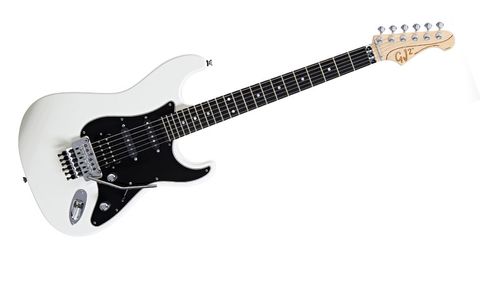Grover Jackson unveils a new addition to his GJ2 brand, the Glendora. A design that harks back to the famed guitar builder's '80s heyday.
Under the Southern Californian sun in the late 70s, rock was given a fundamental shot in the arm due, as is often the case, to a perfect storm of events. The spawning of hair-metal bombast as a reaction to the bloated state of the music of the time was one, and the genre-changing technique of Edward Van Halen was another. The third was the rumble being made by Charvel Guitar Repair, based in the LA suburbs.
"We were the kings of the hill" - Grover Jackson on the 'good old days'
The shop was run by Wayne Charvel and Grover Jackson, and Eddie famously put together his original striped Frankenstein from parts bought there. By the mid 80s, Jackson guitars were the cool tool.
"Everyone who was anyone in the metal business was coming to us for guitars," remembers Grover Jackson today. "We were the kings of the hill."
So, Grover is back with his GJ2 brand and here we check out a new model that harks back to that time, now using modern manufacturing methods and employing lessons learned.
You can't keep an old dog down, and while he doesn't necessarily require lessons in guitar design after all these years, Grover Jackson does take his experience of the good old days and apply it to GJ2. But what he states as the single most important thing he's taken has a particular resonance.
"Financial management would be near the top," he tells us immediately, on the blower from the company's Laguna Hills HQ. "The problem with the Jackson/Charvel era is that I was the chief boffin and I really wasn't watching the till. That ended up coming back to bite me in the ass."
Washburn, Rickenbacker, G&L and Trussart are just some of the familiar names Grover has plied his trade with since, but now he's back making guitars full-time, and with his name on the headstock, too, albeit in a rather smaller point size than he might like.
"One of the biggest concerns I had in the 80s was the inherent inconsistency of the build quality," he continues.
"We had a group of passionate guys making these instruments and some of those earlier guitars were magic, but some weren't that great. You couldn't control the circumstances of a bunch of young guys who'd go out to clubs at night, drinking beer, and come into work the next morning to make guitars.
"Today, when I go to our assembly manager Eugene Morgan, he can't believe the consistency of the instruments we're putting together, which is music to my ears." Ours, too.
Build
With its bolt-on maple neck and double-cut body stylings, the Glendora reaches far back into Grover's history, mirroring the hot-rodded Jackson/Charvel shred guitars of yore. "What I think we've realised and what we do with Glendora is to take the intention behind those instruments of the 80s and try to bottle it and refine it as best we can."
"Each neck is hand-finished - it's smooth, nicely set up and difficult to put down"
The feel of the necks of those early models is the single feature most fervently recalled when two or more old Hollywood rockers meet, and although GJ2 can provide an oil-finished neck, this example's is coated with satin urethane. As Grover says, it's durable and lasts longer than the oil option.
Modern guitarists are spoiled by the number of ultra-comfortable rock guitars on the market, but back in 1977 the choice was limited to say the least, and if the Glendora's superb neck is anything to go by, no wonder Jackson/Charvel's guitars had the effect they did. After a session in a CNC router, each neck is hand-finished - it's smooth, nicely set up and difficult to put down.
Sounds
The bolt-on neck and vintage-styled bridge humbucker means you need to up the gain to a high level and it does sound good for rock styles. If we were to nitpick, we'd suggest a slightly hotter unit would add more cut to solos and tricks such as pinched harmonics.
"If your heart belongs on Sunset Strip in 1978, you'll enjoy how this guitar makes you feel"
Alternatively, the single coils, while perfectly usable for cleaner passages and funky chops, sound a little bit lifeless to us, certainly in comparison with the tones from the Fender Classic Series '60s Strat we had in the office.
One authentic feature is that you can really hear the vibrato's springs reverberating away in the background of the sound, as they vibrate right through the whole bridge assembly. You might want to dampen it down if it annoys you: we love it!
The overall vibe is such that, if, like this reviewer, your heart belongs on Sunset Strip in 1978 sat behind the wheel of a Dodge Charger with Van Halen I on the eight-track, you'll enjoy how this guitar makes you feel.
So, the burning question is this: why would anyone buy either the Glendora over its arguably more famous and certainly more widespread equivalent, the Charvel So-Cal Style 1?
Modern Charvels cost less, so are certainly tempting and they do possess a modicum of the vibe, but there's a lot to be said for the presence of the right guy's DNA and that's what the Glendora has.
That such an important figure in the entire evolution of the electric guitar is back to doing what he loves would be interesting enough, but the fact that the quality of these guitars is up there with those that still bear his name is even better.
If you're in the market for a high-end rock axe, don't miss your chance to try one.

